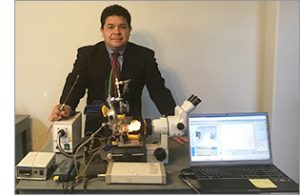Short Course at ECS meetings
This course covers the basics of corrosion science and corrosion engineering. It is targeted towards people with no knowledge of corrosion, but with a physical sciences or engineering background. By the end of this course each student will learn: a) basic concepts of corrosion, b) learn to select appropriate materials for their particular materials/environment, and c) know which will be the common and easiest techniques and methodologies to test and qualify materials (resistant to corrosion).
The course will begin with a general, basic foundation of electrochemistry and corrosion. It will cover the terminology and definitions commonly used in corrosion, as well as the different types of passivity and corrosion. The course will cover typical engineering materials (mostly metals, but we will briefly talk about non-metals, and composites) and their interaction with their environment (temperature, pressure, gases, liquids, chemicals, soils, etc.). We will also learn some of the common methodologies to prevent and control materials degradation (for example: materials selection, adding inhibitors, applying a protective coating, using cathodic or anodic protection, etc.).
Basic knowledge of corrosion monitoring and inspection, as well as field and laboratory testing will be covered. Failure Analysis and case studies will be discussed throughout the different sessions (see below outline).
The course has a practical component where the students will learn (“hands-on”) the basics of sample preparation, polishing, etching, metallography, microscopy, and basic corrosion testing. The students are invited to bring their own samples just in case we have sufficient time to run basic testing on them.
Course outline
- Introduction to Corrosion
- Types of Corrosion
- Interactions of Materials and their Environment
- Corrosion Prevention
- Corrosion Monitoring and Inspection
- Basic Corrosion Testing
- Advanced Corrosion Testing (electrochemistry and microscopy)
- Case studies and lessons learned from failure analysis and corrosion projects
About the instructor
 Luis F. Garfias has a Chemical Engineering degree from the Autonomous University of Yucatan (UADY in Mexico). While doing his Chem. Eng. degree, Luis worked in a Research Institute working with Superconductors. Luis did a M.Sc. on Corrosion Science and Engineering from UMIST (UK), where he learned a broad spectrum of Corrosion topics that he has used throughout his career, his M.Sc. dissertation was related to corrosion of Cr-Ni-Mo alloys under the supervision of Prof. Roger Newman. During his PhD on Materials Science at Oxford University (UK), Luis worked on Pitting Corrosion of Duplex Stainless Steels under the supervision of Prof. John Sykes.
Luis F. Garfias has a Chemical Engineering degree from the Autonomous University of Yucatan (UADY in Mexico). While doing his Chem. Eng. degree, Luis worked in a Research Institute working with Superconductors. Luis did a M.Sc. on Corrosion Science and Engineering from UMIST (UK), where he learned a broad spectrum of Corrosion topics that he has used throughout his career, his M.Sc. dissertation was related to corrosion of Cr-Ni-Mo alloys under the supervision of Prof. Roger Newman. During his PhD on Materials Science at Oxford University (UK), Luis worked on Pitting Corrosion of Duplex Stainless Steels under the supervision of Prof. John Sykes.
Luis was a Postdoctoral Researcher at the Corrosion Research Center in the University of Minnesota (USA) working under Prof. William Smyrl on in-situ microscopy and corrosion of biomedical implant materials. From 1998 to 2005 Luis became a Principal Scientist at Bell Labs where he managed the Reliability and Corrosion Materials Laboratory and did pioneering work on
Corrosion of Electronic materials and devices.
From 2005 to 2007 Luis was the head of the Corrosion Laboratory at SC Johnson where he worked on accelerated methodologies to test and qualify materials used in consumer products. From 2007 to 2012 Luis worked as the Director of Technology Qualification at DNV Columbus where he invented the mini-autoclave to perform in-situ microscopy at High Pressure and High Temperature (HP/HT) in sour environments and worked in many projects related to oil and gas. Luis was recently the Director of Materials and Testing at Intertek and a Consultant at Wood Group Kenny in Houston.
Luis currently works as a consultant for oil and gas companies on projects related to materials science and materials engineering, asset integrity management, and novel techniques for microscopy at HP/HT in aggressive environments. Luis is an active member of NACE and ECS and has published several scientific papers for major corrosion and materials science journals.
